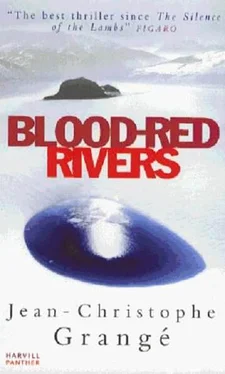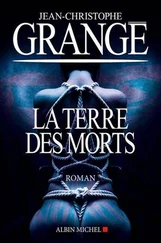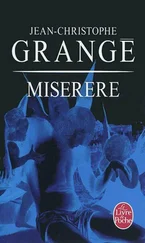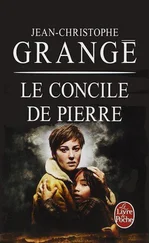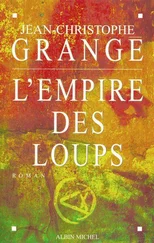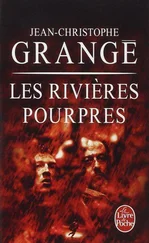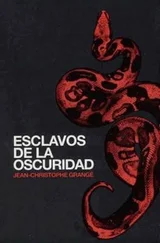
Jean-Christophe Grangé
Blood-Red Rivers aka The Crimson Rivers
1999
Translated from the French by Ian Monk
"Ga-na-mos! Ga-na-mos!"
Pierre Niémans, fingers clenched round his VHF transmitter, stared down at the crowds streaming home across the concrete terraces of Paris's Parc des Princes. Thousands of fiery skulls, white hats, brightly colored scarfs, forming a variegated rippling ribbon. An explosion of confetti. Or a legion of demons seen in a haze of LSD. And those three notes, again and again, slow and ear-splitting: "Ga-na-mos!"
Standing on the roof of the nursery school across the road from the Parc des Princes, the officer was controlling the maneuvers of the third and fourth brigades of the CRS riot police. The men in dark blue were running below their black helmets, protected by their polycarbonate shields. Standard procedure. Two hundred men stationed at each set of gates and a "screen" of commandos whose job it was to stop the two teams' supporters from colliding, getting close, or even noticing each other's existence…
On that evening, for the Saragossa vs Arsenal clash, the only match all year that saw two non-French teams playing against each other in Paris, more than one thousand four hundred policemen and gendarmes had been mobilised. ID checks, body searches, and herding of the forty thousand supporters that had come from the two countries. Superintendent Niémans, his hair cropped, was one of the officers in charge of these maneuvers. It was not his usual line of business, but he enjoyed this sort of exercise. Pure and total surveillance and confrontation. With neither investigations nor procedures. He relished the absolute lack of accountability. And he loved the military look of this marching army.
The supporters had reached the first floor – they could be made out between the concrete fuselage of the construction, just above gates H and G. Niémans looked at his watch. In four minutes' time, they would be outside, spilling across the road. Then would begin the risks of contact, violence, broken ranks. He filled his lungs in one gasp. That October night was seething with tension.
Two minutes. Niémans instinctively turned round and, far away, could see Place de la Porte-de-Saint-Cloud. Completely deserted. Its three fountains soared up in the night, like worried totem poles. All along the avenue, the CRS vans had lined up. In front of them, the men were rolling their shoulder blades, their helmets clipped onto their belts and truncheons slapping against their thighs. The reserve brigades.
The din mounted. The crowd spread out between the iron gratings stuck with spikes. Niémans could not resist smiling. This was what he had come to see. The crowd surged forward. Trumpets broke through the fracas. A rumbling made every inch of the concrete shake. "Ga-na-mos! Ga-na-mos!" Niémans pressed the button on his transmitter and spoke to Joachim, the leader of the East Company. "Niémans here. They're coming out. Push them toward the vans, toward Boulevard Murat, the car parks and the métro."
From his vantage point, he weighed up the situation. There was practically no risk on this side. The Spanish supporters had won the match, and so were the less dangerous. The English were coming out from the far side, gates A to K, toward the Boulogne stand, the lair of the wild beasts. Niémans would go and see what was going on there, once operations had got well and truly under way.
Suddenly, in the gleam of the street-lights a beer bottle shot high above the crowd. The officer saw a truncheon crack downwards, the compact ranks withdraw, men falling. He screamed into his transmitter: "Joachim, for fuck's sake, control your men!"
Niémans rushed to the back stairs and ran down all eight flights. When he emerged onto the avenue, two lines of CRS were already pushing forward, set to bring the hooligans under control. Niémans dashed in front of the armed men and waved his arms in long circular motions. The truncheons were just a few feet from his face when Joachim, his head jammed in his helmet, appeared to his right. He raised his visor and glanced furiously at him:
"Jesus Christ, Niémans, are you crazy or what? You're not in uniform, you're going to get yourself…"
The officer did not deign to reply.
"What the hell's going on here? Control your men, Joachim! Or in three minutes' time we'll have a riot on our hands."
The chubby red-faced captain panted. His little fin-de-siècle moustache twitched in rhythm to his gasping breath. The radio juddered: "Ca…Calling all units…Calling all units…The Boulogne turning…Rue du Commandant-Guilbaud…I…We have a problem!" Niémans stared at Joachim as though he alone were responsible for this chaos. His fingers gripped the transmitter: "Niémans here. We're on our way." Then he calmly gave the captain his orders:
"I'll go. Send as many men there as you can. And sort out the situation here."
Without waiting for a response, the superintendent set off to look for the trainee who was acting as his driver. He crossed the square in long strides and, in the distance, noticed that the barmen of the Brasserie des Princes were lowering their iron shutters. The air was racked with tension. He finally spotted the little dark-haired guy in the leather jacket who was hanging around beside the black saloon car. Niémans thumped his fist down onto the bonnet and yelled:
"The Boulogne turning, quick!"
The two men leapt simultaneously into the car. Its tires smoked as it pulled away. The trainee shot round to the left of the stadium so as to reach Gate K as rapidly as possible along a route specially reserved for the security forces. Niémans had a hunch:
"No," he murmured. "Go round the other way. Then we'll bump straight into the action."
The car spun around one hundred and eighty degrees, skidding on the puddles made by the water cannons already set for the counter-attack. Then it sped away down Avenue du Parc des Princes through a narrow corridor formed by the gray vans of the flying squad. The men in helmets heading the same way made room for it without even glancing at it. The trainee swerved left by Lycée Claude-Bernard then took the roundabout so as to coast along the third side of the stadium. They had just passed by the Auteuil stand.
As soon as Niémans saw the first flurries of gas floating in the air, he knew he had been right: the fighting had already reached Place de l'Europe. The car swept through the white fog and had to brake hard to avoid the first victims, who were in full flight. Battle had been joined in front of the Presidential stand. Men in ties and ladies with jewelry were running, stumbling, tears pouring down their faces. Some of them were looking for a way out onto the streets, while others were climbing back up the steps toward the stadium gates.
Niémans leapt out of the car. On the square, a pitched battle was in progress. The bright colors of the English team and the dark forms of the CRS could just be made out. Some of the latter were crawling on the ground – like half-crushed slugs – while others, at a distance, were hesitating about whether or not to use their antiriot guns for fear of injuring their wounded fellow officers.
The superintendent put away his glasses and tied a scarf round his face. He picked the nearest CRS and snatched away his truncheon, at the same time showing his tricolor card. The man was stunned. His breath misted over the translucent visor of his helmet.
Pierre Niémans ran on toward the confrontation. The Arsenal supporters were attacking with their fists, iron bars and steel toecaps, while the CRS hit back and retreated, trying to defend those already laid out on the ground. Bodies gesticulated, faces creased, jawbones hit the asphalt. Batons went up then rained down, juddering under the force of the blows. The officer pushed his way into the scrum.
Читать дальше
